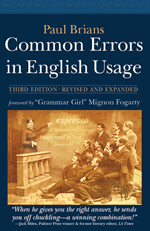This is a subtle point, and hard to explain without using the sort of technical language I usually try to avoid; but if you can learn how to precede gerunds with possessive pronouns, your writing will definitely improve in the eyes of many readers.
Verb forms ending in “-ing” can function as nouns and are sometimes preceded by pronouns. Such verb/noun forms are called “gerunds.” You’ll often see sentences like this: “I didn’t appreciate him returning the car with the gas tank empty.” But “returning” is a gerund, so it should be preceded by a possessive pronoun: “I didn’t appreciate his returning the car. . . .” Other examples of standard usage: “Their coming to my birthday party was a nice surprise.” “I didn’t like his being rude to his teacher.” “They weeded the garden without our having to tell them to.” “Coming,” “being,” and “having” are all gerunds, and require preceding possessive pronouns (“their,” “his,” and “our”). If a person’s name appears just before the gerund, that too needs to be in the possessive form: “We’re excited about Bob’s winning the tournament.”
Not all verb forms ending in “-ing” are gerunds. Some are present participles, and function as adjectives: “a sailing ship,” “a running joke,” “aching back.” These can be preceded by possessive pronouns (“my aching back”), but few people are tempted to use a non-possessive pronoun in this context except in certain dialects (“me aching back”).
Confused? Try this simple rule of thumb: if you have to put a pronoun or noun in front of an “-ing” word, try a possessive one first. If the “-ing” word seems like a thing or an action that could be possessed, it’s probably a gerund. If using a possessive form makes sense, go with it.
BUY THE BOOK!
